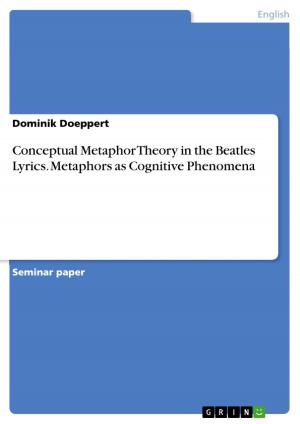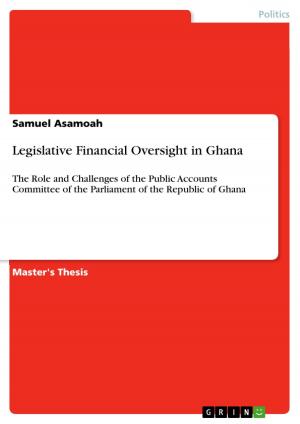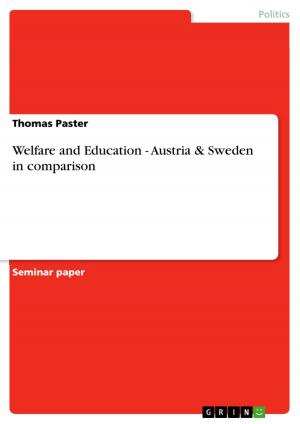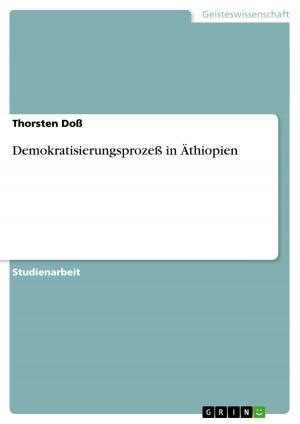Remembering International Terrorist Attacks: A Case Study of the Bali Bombings
Nonfiction, Social & Cultural Studies, Social Science, Demography| Author: | Angela Kuhnert | ISBN: | 9783656736431 |
| Publisher: | GRIN Verlag | Publication: | September 6, 2014 |
| Imprint: | GRIN Verlag | Language: | English |
| Author: | Angela Kuhnert |
| ISBN: | 9783656736431 |
| Publisher: | GRIN Verlag |
| Publication: | September 6, 2014 |
| Imprint: | GRIN Verlag |
| Language: | English |
Research Paper (postgraduate) from the year 2014 in the subject Sociology - Social System, Social Structure, Class, Social Stratification, grade: 1,7, Humboldt-University of Berlin (Institut für Asien- und Afrikawissenschaften), course: Memory Making and Heritage in Southeast Asia, language: English, abstract: Worldwide numerous terrorist attacks have shattered societies. In recent time, especially those generating a sense of the West versus the Muslim world, gained large public attention such as the attacks of the World Trade Center in New York City in 2001 and the bombings of Madrid in 2004 and London in 2005. Attacks, such as these, have not only happened on 'Western ground', but also Indonesia has been a victim of several terrorist attacks mainly targeting sites predominantly visited by Westerners, such as the hotel bombings in Jakarta in 2009 and the Bali Bombings in 2002 and 2005. The initiator of these terrorist attacks was the Islamic group Jemaah Islamiah with its spiritual leader Abu Bakar Bashir (West, 2008). This organization strives for an introduction of Shariah law in Muslim nations and perceives the Islamic faith to be oppressed by increasing influence of Western values in the Islamic World (West, 2008). Jemaah Islamiah, thus, justifies its attacks as defending the religion of Islam and its values from the perceived thread of the Western influence. Large attacks such as these in Indonesia lead to a large media attention, especially the random and high number of foreign victims lead to worldwide attention (Blakesley, 2007; Crenshaw, 2000; Turk, 2004). Therefore following definition of terrorism by Gibbs (in Turk, 2004, p. 284) will be used in this paper: Terrorism is threatening, perhaps illegal, clandestine (avoiding conventional warfare) violence against human or nonhuman objects that is intended to change or maintain some belief, law, institution, or other social 'norm' by inculcating fear in persons other than the immediate targets. Gibbs, therefore, considers an attempt for social control as a possible base for explanatory theory (Turk, 2004). Johnson (1994 in Crenshaw, 2000, p. 415) states how the loss of order and control leads to an exaggeration of the likelihood of such an attack. Destabilizing society by shattering its moral values is used to put forward a political message. ''Memory is the meaning we attach to experience, not simply recall of events and emotions of that experience' (Stern, 2004 in Barbara, 2009, p. 83); and is thus necessary to make sense of the present; it provides a time and space reference and is therefore also crucial in order to build the future' (Barbera, 2009, p. 76). Halbwachs distinguishes between autobiographical memory which is the memory of our firsthand experience, historical memory which is gained thr
Research Paper (postgraduate) from the year 2014 in the subject Sociology - Social System, Social Structure, Class, Social Stratification, grade: 1,7, Humboldt-University of Berlin (Institut für Asien- und Afrikawissenschaften), course: Memory Making and Heritage in Southeast Asia, language: English, abstract: Worldwide numerous terrorist attacks have shattered societies. In recent time, especially those generating a sense of the West versus the Muslim world, gained large public attention such as the attacks of the World Trade Center in New York City in 2001 and the bombings of Madrid in 2004 and London in 2005. Attacks, such as these, have not only happened on 'Western ground', but also Indonesia has been a victim of several terrorist attacks mainly targeting sites predominantly visited by Westerners, such as the hotel bombings in Jakarta in 2009 and the Bali Bombings in 2002 and 2005. The initiator of these terrorist attacks was the Islamic group Jemaah Islamiah with its spiritual leader Abu Bakar Bashir (West, 2008). This organization strives for an introduction of Shariah law in Muslim nations and perceives the Islamic faith to be oppressed by increasing influence of Western values in the Islamic World (West, 2008). Jemaah Islamiah, thus, justifies its attacks as defending the religion of Islam and its values from the perceived thread of the Western influence. Large attacks such as these in Indonesia lead to a large media attention, especially the random and high number of foreign victims lead to worldwide attention (Blakesley, 2007; Crenshaw, 2000; Turk, 2004). Therefore following definition of terrorism by Gibbs (in Turk, 2004, p. 284) will be used in this paper: Terrorism is threatening, perhaps illegal, clandestine (avoiding conventional warfare) violence against human or nonhuman objects that is intended to change or maintain some belief, law, institution, or other social 'norm' by inculcating fear in persons other than the immediate targets. Gibbs, therefore, considers an attempt for social control as a possible base for explanatory theory (Turk, 2004). Johnson (1994 in Crenshaw, 2000, p. 415) states how the loss of order and control leads to an exaggeration of the likelihood of such an attack. Destabilizing society by shattering its moral values is used to put forward a political message. ''Memory is the meaning we attach to experience, not simply recall of events and emotions of that experience' (Stern, 2004 in Barbara, 2009, p. 83); and is thus necessary to make sense of the present; it provides a time and space reference and is therefore also crucial in order to build the future' (Barbera, 2009, p. 76). Halbwachs distinguishes between autobiographical memory which is the memory of our firsthand experience, historical memory which is gained thr















